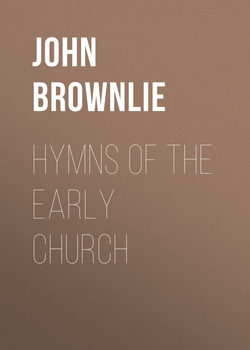Hymns of the Early Church

Реклама. ООО «ЛитРес», ИНН: 7719571260.
Оглавление
John Brownlie. Hymns of the Early Church
Sundays and Week Days
SUNDAY MORNING. DIE, DIERUM PRINCIPE
O NATA LUX DE LUMINE
TU TRINITATIS UNITAS
SUNDAY EVENING. DEUS CREATOR OMNIUM
O DEUS, EGO AMO TE, NEC AMO TE, UT SALVES ME
LUCIS CREATOR OPTIME
MONDAY MORNING. AURORA JAM SPARGIT POLUM
MONDAY EVENING. JESU, DULCIS MEMORIA
TUESDAY MORNING. O DEUS, EGO AMO TE, NAM PRIOR TU AMASTI ME
TUESDAY EVENING. TE LUCIS ANTE TERMINUM
WEDNESDAY MORNING. JAM META NOCTIS TRANSIIT
WEDNESDAY EVENING. LABENTE JAM SOLIS ROTÂ
THURSDAY MORNING. SPLENDOR PATERNÆ GLORIÆ
THURSDAY EVENING. SALVATOR MUNDI, DOMINE
FRIDAY MORNING. CHRISTE, LUMEN PERPETUUM
FRIDAY EVENING. NOX ATRA RERUM CONTEGIT
SATURDAY MORNING. JAM LUCIS ORTO SIDERE
SATURDAY EVENING. JAM SOL RECEDIT IGNEUS
Advent
CHRISTE, PRECAMUR ANNUE
IN NOCTIS UMBRA DESIDES
VENI, VENI, EMMANUEL!
Christmas
NATO NOBIS SALVATORE
PUER NATUS IN BETHLEHEM
HEU! QUID JACES STABULO, OMNIUM CREATOR?
QUICUMQUE CHRISTUM QUÆRITIS
Epiphany
JESU, NOSTRA REDEMPTIO
EI CANAMUS GLORIAM
DEUS-HOMO, REX CŒLORUM
Passion Week
VEXILLA REGIS PRODEUNT
PANGE, LINGUA, GLORIOSI, PRŒLIUM CERTAMINIS
LUSTRA SEX QUI JAM PEREGIT
CRUX AVE BENEDICTA
HORÆ DE PASSIONE D. N. JESU CHRISTI
Easter
FINITA JAM SUNT PRÆLIA
PLAUDITE, CŒLI!
MORTIS PORTIS FRACTIS
ALLELUIA, DULCE CARMEN
Ascension
ÆTERNE REX ALTISSIME
POSTQUAM HOSTEM ET INFERNA
CŒLOS ASCENDIT HODIE
O CHRISTE, QUI NOSTER POLI
Whitsuntide
VENI, CREATOR SPIRITUS, MENTES TUORUM VISITA
VENI, SANCTE SPIRITUS ET EMITTE CŒLITUS
O FONS AMORIS, SPIRITUS
Trinity
TU TRINITATIS UNITAS
O PATER SANCTE, MITIS ATQUE PIE
ADESTO, SANCTA TRINITAS
All Saints
PUGNATE, CHRISTE MILITES
AUDI NOS, REX CHRISTE
Communion
EJA O DULCIS ANIMA
O ESCA VIATORUM
JESU, DULCEDO CORDIUM
VERBUM SUPERNUM PRODIENS
Death and Judgment
GRAVI ME TERRORE PULSAS
APPROPINQUAT ENIM DIES IN QUA JUSTES ERIT QUIES
Heaven
JERUSALEM LUMINOSA VERÆ PACIS VISIO
URBS BEATA HIERUSALEM
Отрывок из книги
The Latin poetry of the Christian Church presents a tempting field for the exercise of scholarship and research. The relation in which it stands on the one hand to the classic poetry of Greece and Italy, and on the other to the Liturgies of the Eastern Church, the placing of accent in the room of quantity, and the rise and growth of rhyme – these and such-like matters will always prove attractive to experts and specialists. They are, however, quite beyond the scope of this brief paper. Those who wish to make an exhaustive study of a subject which has many sides and a copious literature, would do well to betake themselves to such standard works as are noted below.1 The general reader may find something to profit and to interest him in the following general survey.
The title placed on our Saviour’s cross, setting forth His accusation – “Jesus of Nazareth, the King of the Jews,” was written in three languages – in Hebrew and in Greek and in Latin. That collocation of languages gives the order in which the hymnody of the Church developed.
.....
The use of hymns for purposes of private devotion preceded their insertion in the liturgical books of the pre-Reformation Church. Up to the seventh century the Breviaries which contained the prayers to be offered at the canonical hours had as matter to be sung only the words of Scripture. But the Spanish Council which met at Toledo in A.D. 633, laid down the general principle, that if in the worship of the sanctuary prayers may be offered in the words of uninspired men, so also may praise be sung. From that time the Churches of Western Christendom inserted hymns in their service-books, some of these compositions being of earlier date, but the larger number being of more recent times and of purely local interest. As every diocese and religious order claimed and exercised the right to construct its own ritual, Missal, and Breviary, there was endless variety of contents, considerable alterations of old compositions, and a general deterioration of quality. By the time Leo X. reached St. Peter’s chair the need for revision had become clamant. Under the direction of that Medicean Pope, the collection of hymns in use at Rome was recast; and ultimately the entire Breviary appeared in revised form, when Urban VIII. was Pope, in 1631. In this revised Roman Breviary, which is now in general use throughout the Papal communion, the hymns of earliest composers – say from Hilary to Gregory – are for the most part allowed to remain, although in some cases altered without real amendment; but in the case of those pieces which could not be conformed to the laws of correct Latinity there was an entire recasting. According to one authority, himself a revisionist, upwards of nine hundred alterations were made in the interests of metre, and the first lines of more than thirty hymns were altered. The Marquis of Bute executed a translation of the Roman Breviary in 1879, and then gave it as his deliberate judgment that the revisers, “with deplorable taste made a series of changes in the texts of the hymns which has been disastrous both to the literary merit and the historical interest of the poems.”
The Breviary of Paris has been subjected to revisions in the sixteenth, seventeenth, and eighteenth centuries. The third and latest revision was intrusted to a commission of three ecclesiastics, one of whom belonged to the Jansenist party, while another was Charles Coffin, then Rector of the University of Paris, who did the greater part of the work of editing, altering, and tinkering. Under Coffin’s manipulation only twenty-one hymns of the earlier period were retained, and the number of those from the pens of comparatively modern French writers was largely increased.
.....